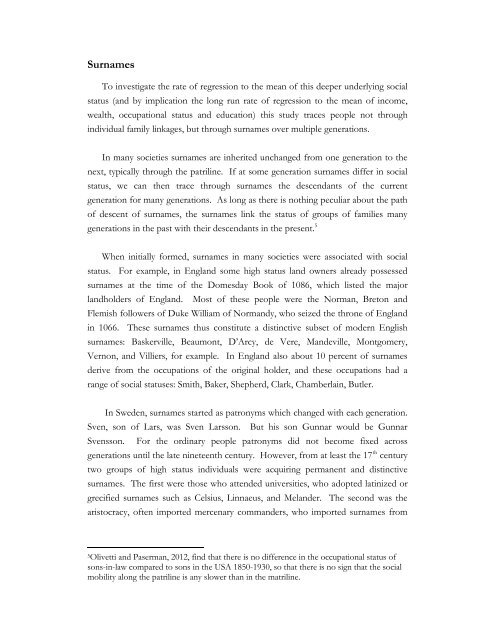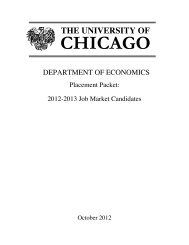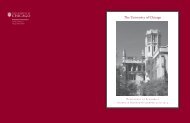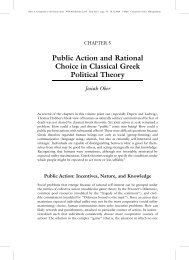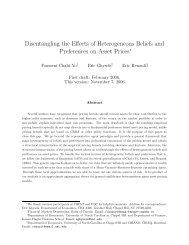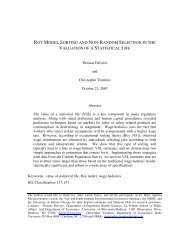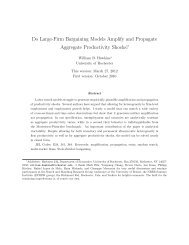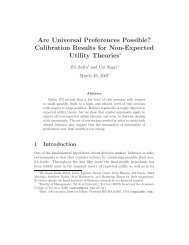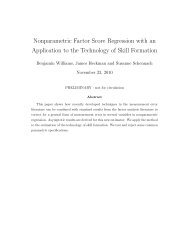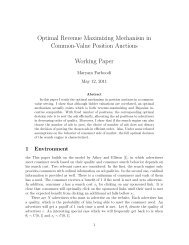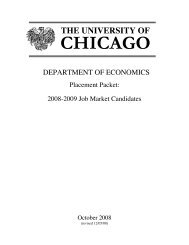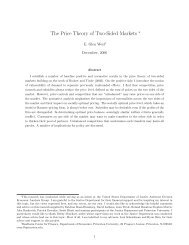Surnames and a Theory of Social Mobility - University of Chicago ...
Surnames and a Theory of Social Mobility - University of Chicago ...
Surnames and a Theory of Social Mobility - University of Chicago ...
Create successful ePaper yourself
Turn your PDF publications into a flip-book with our unique Google optimized e-Paper software.
<strong>Surnames</strong><br />
To investigate the rate <strong>of</strong> regression to the mean <strong>of</strong> this deeper underlying social<br />
status (<strong>and</strong> by implication the long run rate <strong>of</strong> regression to the mean <strong>of</strong> income,<br />
wealth, occupational status <strong>and</strong> education) this study traces people not through<br />
individual family linkages, but through surnames over multiple generations.<br />
In many societies surnames are inherited unchanged from one generation to the<br />
next, typically through the patriline. If at some generation surnames differ in social<br />
status, we can then trace through surnames the descendants <strong>of</strong> the current<br />
generation for many generations. As long as there is nothing peculiar about the path<br />
<strong>of</strong> descent <strong>of</strong> surnames, the surnames link the status <strong>of</strong> groups <strong>of</strong> families many<br />
generations in the past with their descendants in the present. 5<br />
When initially formed, surnames in many societies were associated with social<br />
status. For example, in Engl<strong>and</strong> some high status l<strong>and</strong> owners already possessed<br />
surnames at the time <strong>of</strong> the Domesday Book <strong>of</strong> 1086, which listed the major<br />
l<strong>and</strong>holders <strong>of</strong> Engl<strong>and</strong>. Most <strong>of</strong> these people were the Norman, Breton <strong>and</strong><br />
Flemish followers <strong>of</strong> Duke William <strong>of</strong> Norm<strong>and</strong>y, who seized the throne <strong>of</strong> Engl<strong>and</strong><br />
in 1066. These surnames thus constitute a distinctive subset <strong>of</strong> modern English<br />
surnames: Baskerville, Beaumont, D’Arcy, de Vere, M<strong>and</strong>eville, Montgomery,<br />
Vernon, <strong>and</strong> Villiers, for example. In Engl<strong>and</strong> also about 10 percent <strong>of</strong> surnames<br />
derive from the occupations <strong>of</strong> the original holder, <strong>and</strong> these occupations had a<br />
range <strong>of</strong> social statuses: Smith, Baker, Shepherd, Clark, Chamberlain, Butler.<br />
In Sweden, surnames started as patronyms which changed with each generation.<br />
Sven, son <strong>of</strong> Lars, was Sven Larsson. But his son Gunnar would be Gunnar<br />
Svensson. For the ordinary people patronyms did not become fixed across<br />
generations until the late nineteenth century. However, from at least the 17 th century<br />
two groups <strong>of</strong> high status individuals were acquiring permanent <strong>and</strong> distinctive<br />
surnames. The first were those who attended universities, who adopted latinized or<br />
grecified surnames such as Celsius, Linnaeus, <strong>and</strong> Mel<strong>and</strong>er. The second was the<br />
aristocracy, <strong>of</strong>ten imported mercenary comm<strong>and</strong>ers, who imported surnames from<br />
5Olivetti <strong>and</strong> Paserman, 2012, find that there is no difference in the occupational status <strong>of</strong><br />
sons-in-law compared to sons in the USA 1850-1930, so that there is no sign that the social<br />
mobility along the patriline is any slower than in the matriline.


